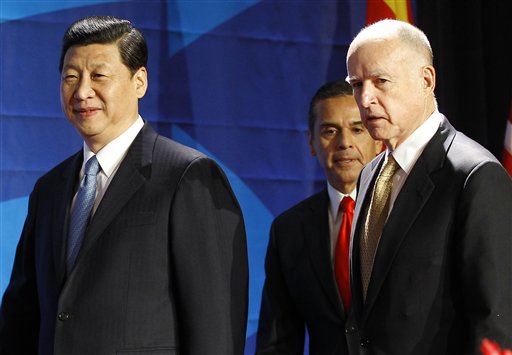LOS ANGELES — Chinese Vice President Xi Jinping wrapped up a U.S. visit today by urging closer ties and arguing that Americans benefit from their trade relationship with China.
“A prosperous and stable China will not be a threat to any country,” Xi said. “It will only be a positive force for world peace and development.”
Xi, who is expected to become president of the world’s most populous nation next year, started the last of his four days in the United States at a downtown Los Angeles trade conference hosted by the Chinese Ministry of Commerce. His American counterpart, Vice President Joe Biden, join him later.
California Gov. Jerry Brown and Los Angeles Mayor Antonio Villaraigosa both lauded the U.S.-China relationship.
“We’ve got a great future together,” said Brown, who announced plans to open a new trade and investment office in China.
China is a major trade partner with Los Angeles, which has greatly benefited from its Pacific Rim position and has courted Chinese businesses and their potential jobs.
A day earlier, Xi toured the Port of Los Angeles, the nation’s busiest port complex. Nearly 60 percent of the imports moving through the port come from China.
U.S. Commerce Secretary John Bryson also encouraged more Chinese investment, commenting that “America is truly open for business.” However, he also called for balancing the economic and trade relationship, which has been a lightning rod for critics of China.
Trade between the two countries increased exponentially last year but the U.S. trade deficit also grew by 30 percent, Bryson said.
“We have to work harder to achieve balanced trade growth,” he said.
Any view that the U.S. is the loser in its trade relationship with China “does not square with facts,” Xi said through a translator.
Chinese imports have helped Americans improve their standard of living and created more than 3 million new jobs in the U.S. from 2001 to 2010, Xi said.
U.S.-China trade is expected to top $500 billion soon, and the countries have moved from “mutual estrangement to a close exchange with increasingly intertwined interests,” he said.
After opening remarks at the trade forum, Xi and Biden visited a suburban school in South Gate that specializes in Asian studies to promote having more American students study in China. The vice presidents watched a traditional Chinese “dragon dance” performed by middle and high school students at the International Studies Learning Center, a public school that is part of the Asia Society’s network of schools across the country.
“You are an impressive group of students,” Biden said. “Thank you for making America look so good.”
Biden told the students that the U.S.-China relationship is the single most important relationship the country has in the 21st century. Biden said he and President Barack Obama believe that the most significant factor in improving U.S.-China ties is increasing educational opportunity for American students in China. Under the 100,000 Strong Initiative, the White House aims to have at least that many American students studying in China.
Xi, who spoke with a class of high school students learning Chinese, lauded their mandarin skills, saying it was important to learn the culture as well as the language to avoid misunderstandings.
Xi’s U.S. tour comes at a politically challenging time in U.S.-China relations, with the White House sending stern messages on currency and trade policies, and Republican presidential candidates claiming Obama isn’t doing enough to keep America’s economy competitive with China’s.
The Asian power sells four times as many goods to the U.S. as the United States sends in return to China. However, China became the top market for U.S. agricultural goods last year, purchasing $20 billion in U.S. agricultural exports, according to the U.S. Department of Agriculture.
Send questions/comments to the editors.



Success. Please wait for the page to reload. If the page does not reload within 5 seconds, please refresh the page.
Enter your email and password to access comments.
Hi, to comment on stories you must . This profile is in addition to your subscription and website login.
Already have a commenting profile? .
Invalid username/password.
Please check your email to confirm and complete your registration.
Only subscribers are eligible to post comments. Please subscribe or login first for digital access. Here’s why.
Use the form below to reset your password. When you've submitted your account email, we will send an email with a reset code.